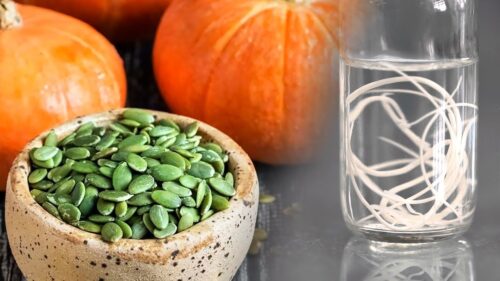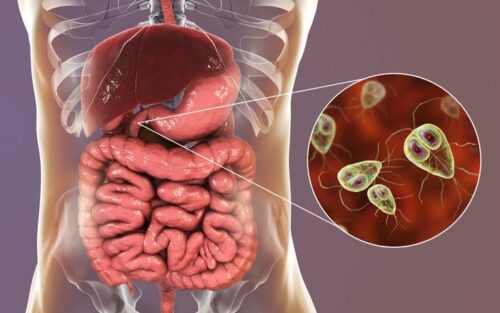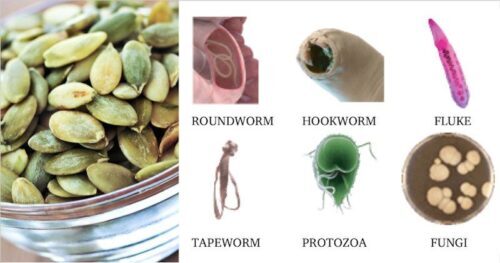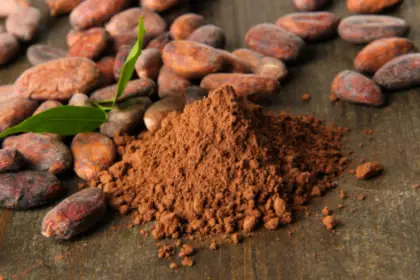In the intricate web of human history, the battle against intestinal parasites and tapeworms has been a relentless struggle, woven into the fabric of our lives for millennia. As humanity evolved, so did our quest for effective remedies, leading us on an enlightening journey through ancient traditions and folk wisdom.
One of the best but not well known anecdotes – the pumpkin seed, revered by generations as a potent anti-parasitic remedy.
As science and medicine advance, the allure of these tiny seeds remains undiminished, their enigmatic reputation intriguing both researchers and seekers of alternative healing. From Native American tribes to the folklore of distant lands, tales of pumpkin seeds’ efficacy in expelling parasites have been passed down, inspiring generations to embrace this age-old wisdom.
Long celebrated as a delicious and nutritious snack, these unassuming seeds have now emerged as a strong natural antiparasitic against intestinal parasites and tapeworms. The scientific community’s latest findings have sent shockwaves through the medical world, as they reveal a groundbreaking method to eradicate these insidious gut invaders in a mere three days.
Pumpkin Seeds Used As Ancient Medicine

The history of folklore medicine surrounding pumpkin seeds dates back centuries, with various cultures around the world attributing remarkable healing properties to these unassuming seeds. Passed down through generations, these beliefs have shaped a rich tapestry of traditional remedies that center on the consumption of pumpkin seeds for various health benefits, particularly in dealing with intestinal parasites and tapeworms.
The earliest records of using pumpkin seeds as medicine can be traced to Native American tribes, who cultivated pumpkins and valued them not only for their nutritious flesh but also for their seeds. Native American healers recognized the seeds’ potential in expelling intestinal parasites and believed in their ability to promote digestive health.
As the pumpkin plant spread to other parts of the world, diverse cultures adopted their unique folklore surrounding pumpkin seeds. In parts of Central and South America, traditional healers and herbalists employed pumpkin seeds to address gastrointestinal issues and intestinal worms. The seeds were often ground into a paste or infused as tea to harness their purported healing powers.
In European folklore, particularly in Eastern European regions, pumpkin seeds became a popular remedy for treating tapeworm infections. The seeds were believed to work as a natural anthelmintic, a substance capable of destroying parasitic worms. Folk healers would prepare concoctions using pumpkin seeds and administer them as part of cleansing rituals.
Beyond their purported medicinal uses, pumpkin seeds also found a place in cultural traditions and superstitions. In some societies, they were associated with fertility and used as symbolic offerings during certain ceremonies and celebrations.
Over time, as modern medicine advanced and became dominant, the significance of folklore medicine waned, and scientific skepticism grew regarding the efficacy of traditional remedies. However, despite the lack of comprehensive scientific evidence, folklore surrounding pumpkin seeds persisted in many communities, kept alive by oral traditions and cultural practices.
While modern medicine remains the primary approach for treating such conditions, pumpkin seeds are proven to offer significant relief without the cost or side effects of pharmaceutical drugs.
Studies investigating the anthelmintic properties of pumpkin seeds have provided evidence to support their historical use in expelling intestinal parasites and tapeworms. These studies have typically involved in vitro and animal models, exploring the effects of pumpkin seed extracts or preparations on various parasitic organisms.
Research has shown that compounds found in pumpkin seeds, such as cucurbitacin and other bioactive substances, exhibit antiparasitic activity. These compounds have been observed to interfere with the metabolism and survival of parasites, leading to their expulsion or death.
Additionally, studies have reported positive outcomes when using pumpkin seed extracts to combat specific parasitic infections in animals. These experiments demonstrated a reduction in parasite burden and an improvement in overall gastrointestinal health after administering pumpkin seed preparations.
Now, as we stand on the precipice of a potential medical breakthrough, it becomes essential to explore the scientific evidence behind this ancient belief. How can something as commonplace as pumpkin seeds harbor such extraordinary properties?

How Do I Know If I Have Intestinal Parasites and Tapeworms
The symptoms of having an intestinal parasite or tapeworm in humans can vary depending on the type of parasite and the severity of the infection. Some common symptoms include:
- Abdominal Pain and Discomfort: Parasites residing in the intestines can cause abdominal pain, cramps, and discomfort. The pain may range from mild to severe.
- Diarrhea or Constipation: Intestinal parasites can disrupt the normal functioning of the digestive system, leading to diarrhea or constipation. Changes in bowel movements are common symptoms.
- Nausea and Vomiting: Infected individuals may experience nausea and occasional vomiting, especially if the infection is severe.
- Unexplained Weight Loss: A persistent intestinal parasite infection can lead to unexplained weight loss due to malabsorption of nutrients and changes in appetite.
- Fatigue and Weakness: Parasitic infections can cause fatigue, weakness, and a general feeling of being unwell.
- Bloating and Gas: Excessive gas and bloating can occur as a result of intestinal parasites disrupting the gut microbiota and digestion.
- Anemia: Certain parasitic infections can lead to anemia, a condition characterized by low levels of red blood cells, causing weakness and fatigue.
- Itching around the Anus: Some parasites, like pinworms, can cause itching and irritation around the anus, especially at night.
- Visible Worms in Stool: In some cases, segments of tapeworms or entire worms may be visible in the stool.
- Allergies or Skin Rashes: Chronic parasitic infections can trigger allergic reactions or skin rashes in some individuals.
It’s essential to note that many intestinal parasitic infections may not show any symptoms initially or may have symptoms similar to other common illnesses. Therefore, a definitive diagnosis can only be made through medical testing, which may involve analyzing stool samples for the presence of parasite eggs or other diagnostic methods as prescribed by a healthcare professional.
If someone suspects they have an intestinal parasite or tapeworm infection, they should seek medical attention for proper diagnosis and appropriate treatment. Early detection and treatment are crucial to prevent complications and further spread of the infection.
Use Pumpkin Seed Oil To Fight Off Intestinal Parasites and Tapeworms
Pumpkin seed oil is an extract that encapsulates the potent bioactive compounds found within the seeds, making it a concentrated elixir of nature’s goodness. Harnessing the anthelmintic potential of pumpkin seed oil can be a simple yet effective process.
I get my cold pressed pumpkin seeds oil from Activation Products.
Click Here To Grab Yours Now!
Use the discount code: HealthyWildFree at checkout for a discount.
According to the National Institute Of Health Study:
“Pumpkin seed extracts may be used to control of Gastrointestinal (G.I.) nematode infections. This relatively inexpensive alternative to the currently available chemotherapeutic should be considered as a novel drug candidate in the nearest future.”
Just adding the recommended 3 a day soft-gels to your daily regimen will boost your bodies ability to fight off nasty parasites and tapeworms.
While pumpkin seed oil shows promise in promoting gut health, it is essential to approach its usage with a balanced perspective. As a complementary remedy, it should not be viewed as a replacement for professional medical advice or prescribed treatments. If suspecting an intestinal parasite or tapeworm infection, seeking the guidance of a healthcare provider is crucial for a comprehensive evaluation and appropriate treatment plan.
Embracing Ancient Wisdom in a Modern World
As we conclude our exploration of pumpkin seed oil’s potential in combating intestinal parasites and tapeworms, science continues to shed light on the remarkable properties of this golden elixir. Let us not forget the wisdom of our ancestors, who instinctively turned to nature for solutions to health challenges.
Pumpkin seed oil stands as a testament to the symbiotic relationship between traditional knowledge and modern research. It beckons us to embrace the possibilities of natural remedies while harmoniously coexisting with evidence-based medicine.
In our quest for wellness, let us honor the treasures bestowed upon us by Mother Nature, recognizing that within the simplicity of a pumpkin seed lies a hidden power capable of safeguarding our gut health. As we take steps towards a healthier tomorrow, may we cherish the timeless legacy of folklore medicine, cherishing the age-old wisdom that resides in our collective heritage.
Recommended Supplement:
Radiate 21 is a formula that contains 21 ingredients that help to balance the gut micriobiome and keep parasites in check. These ingredients include neem, garlic, oregano, clove and many other ingredients which directly probhibit the replication of parasites as well as make their environment (in your gut) difficult to live in. Visit Radiate21.com to learn more!






